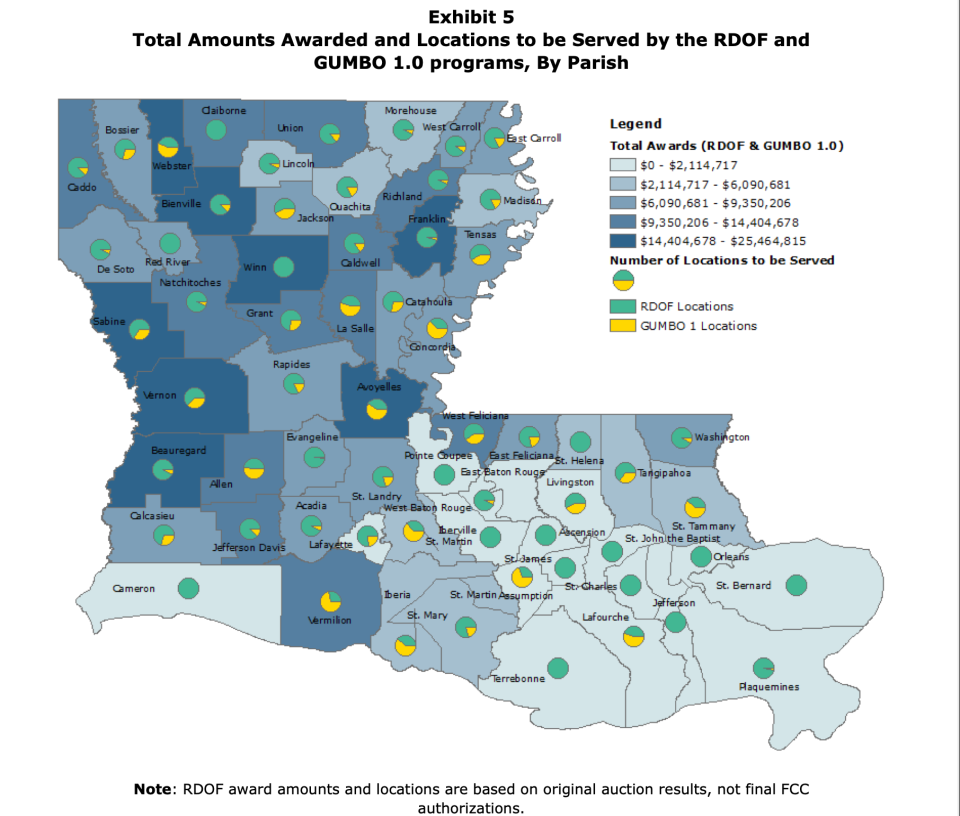Federal broadband expansion projects see mixed progress in Louisiana

Canva image
Louisiana has completed several of its American Rescue Plan Act rural broadband projects across the state, while a separate federal broadband program is lagging behind schedule.
Approximately 78% of the ARPA projects are either actively under construction or have been completed, and the remaining ones should be completed within the next 12 months, according to data from the state Office of Broadband Development and Connectivity.
Louisiana received $176 million in federal broadband funding from the American Rescue Plant Act that President Joe Biden signed into law in March 2021.
Beginning in November 2022, the state broadband office awarded $132 million of that amount in grants to a number of internet service providers (ISPs) to expand fiber optic lines to 65,000 unserved or underserved locations.
Unserved locations are defined as those that receive internet speeds of less than 25 megabits per second (Mbps) download and 3 Mbps upload, while underserved locations have speeds between 25/3 and 100/20 Mbps.
Marketed as the GUMBO (Granting Unserved Municipalities Broadband Opportunities) program, it has so far seen 22% of its projects completed, and the remainder will wrap up by June 2025. That translates to 14,000 locations that now have new high-speed internet service as of May 31, according to the state broadband office.
Louisiana’s rollout of ARPA broadband funds has gone relatively fast compared to other programs such as the Rural Digital Opportunity Fund (RDOF), a separate broadband infrastructure grant program administered by the Federal Communications Commission.
RDOF, created in 2019, has seen only about 10% of its projects completed in Louisiana, according to a report from the Louisiana Legislative Auditor. Nationwide, roughly one-third of RDOF grants were defaulted on, meaning the bidder couldn’t fulfill its commitments, according to a report in Broadband Breakfast.
In comparison, Louisiana’s ARPA grant projects are being completed in an average of two years, according to data from the state broadband office.
The National Digital Inclusion Alliance’s Digital Equity Index ranked Louisiana sixth in the country for how well the state government and local governments are addressing digital equity.
Rep. Daryl Deshotel, R-Marksville, who has spearheaded much of the legislative framework for rural broadband expansion, created the Louisiana Office of Broadband Development and Connectivity in 2020.
Louisiana was one of the only states in the nation to have such an office at that time, and it gave the state an edge when it came to applying for more federal dollars under Biden’s Bipartisan Infrastructure Law.
In November, Louisiana was one of only three states to complete an eight step process to receive its promised allocation of funding for its Broadband Equity Access and Deployment program (BEAD). As a result, Louisiana was the first to receive funding and will begin issuing those grants in August under the “GUMBO 2.0” brand.
A recent report from the Louisiana Legislative Auditor found that the state’s broadband office is short on staffing but has largely addressed the state-level barriers to broadband expansion. However, the Auditor noted, many of the delays in the development of broadband infrastructure exist at the local level such as long permitting reviews.
Another challenge with rural broadband expansion has been the cutthroat business practices of some of the legacy internet service providers (ISPs) that oppose the grant programs that threaten to disrupt their exclusivity in a given area.
Deshotel said it has been a constant battle with many of the large existing ISPs either trying to prevent new providers from getting the grant money or trying to thwart the grant programs entirely.
“They are protecting their monopoly,” he said.
Deshotel got a bill passed this year to allow the state to use the $44 million in leftover ARPA funds for other purposes within federal guidelines. Those purposes could include things like workforce development.
Deshotel noted that Cox Communications is suing the state in an effort to challenge the grant program.
Other telecom giants filed administrative protests against small companies that initially won grant awards for areas underserved by those telecom giants in an effort to stave off competition. The state broadband office resolved most of the protests in favor of the initial award recipients.
The post Federal broadband expansion projects see mixed progress in Louisiana appeared first on Louisiana Illuminator.


